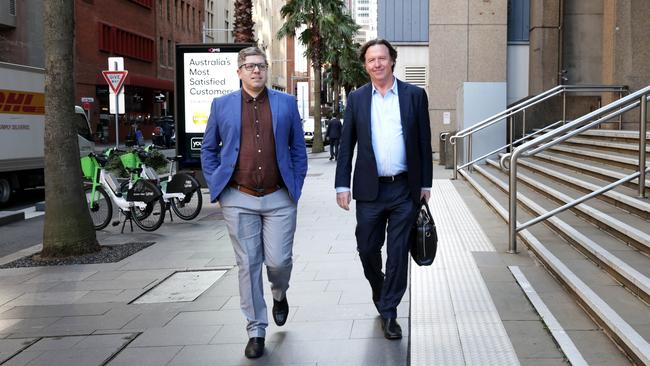Court rejects claim Fortescue doesn’t have strong case against rival but questions disclosure
Mining giant Fortescue has welcomed a Federal Court decision to throw out a request from its would-be ‘green’ steel competitor even though a judge questioned its commercial disclosure.

Business
Don't miss out on the headlines from Business. Followed categories will be added to My News.
The Federal Court has found that Fortescue failed to disclose a key matter when applying for search orders to raid the homes and business of its would-be “green” steel competitors, but it ultimately sided with the mining giant in an intellectual property fight.
Andrew Forrest’s Fortescue has accused its former executives, Bart Kolodziejczyk and Michael Masterman, of stealing its trade secrets to launch their company, Element Zero.
In May, Fortescue secured from the Federal Court search orders to raid Element Zero properties in order to seize and preserve material that could be relevant or used as evidence in potential future litigation.
But Dr Kolodziejczyk and Dr Masterman asked Federal Court judge Brigitte Markovic to discharge the earlier orders granted, on the basis that Fortescue’s prima facie case was overstated and there was material nondisclosure among other alleged issues.

While Justice Markovic threw out Element Zero’s application, she said Fortescue should have told the court about a commercial relationship between it and Mr Masterman.
“I am not satisfied that the EZ respondents have established that Fortescue had a weak prima facie case,” she said.
“The question is whether evidence of Fortescue’s relationship with Element Zero, through Mr Masterman, and the discussions it had about the different concerns it held in December to January 2024 was capable of having affected the court’s decision, in particular in relation to the consideration of the risk of destruction. In my view, on balance, it was,” she said.
“The fact of the ongoing relationship, and the issues raised and discussions with Element Zero in the latter part of 2023 and early 2024, were facts which should have been brought to the court’s attention on the application for the search orders.
“Those facts were relevant to the question of whether there was a real risk of destruction given past co-operation, albeit about different issues.”
Element Zero had also asked the court to set aside the search orders because it claimed surveillance conducted in the lead-up to obtaining them was excessive.
It emerged that Fortescue employed former SAS soldier Robert Lancaster to spy on Element Zero staff and its families for up to 17 hours per day. The surveillance included following family members to Kmart, rummaging through mail and taking pictures of their children leaving school.
Element Zero argued the surveillance reports produced presented a misleading picture to the court, which coloured it as “nefarious” and “dishonest”.
But Justice Markovic accepted surveillance conducted by private investigators was necessary.
“As I have already observed, the private investigator’s reports are lengthy and detailed. However, on their face they do not disclose any collateral purpose. Rather, they attempt to provide information necessary for an application for search orders and as required by the court’s search orders practice note,” she said.
“One way of obtaining that information is to instruct qualified persons to attend at and observe premises. In this case, Fortescue chose to do so by instructing a private investigator firm.
“Finally, that the surveillance reports were lengthy, to a degree repetitious and perhaps inelegantly expressed, cannot justify setting aside the search orders.”
A spokesman for Element Zero said it wanted the search orders set aside primarily based on Fortescue’s “failure to disclose the ongoing commercial relationship” with Fortescue.
“Although Element Zero believes that the orders should have been set aside, and is still considering challenging that result, it is pleased that the court varied the search orders to quarantine all of the materials seized during the raids,” he said.
“This means that Fortescue cannot access any of the 12 million documents and must now follow standard discovery processes.”
A spokesman for Fortescue said it would continue to “rigorously protect its intellectual property in every part of its green energy, technology and metals business”.
“With Justice Markovic’s decision, two Federal Court judges have now found a strong prima facie case that the Element Zero parties misused Fortescue’s confidential information and breached its rights, and have determined that there was a real risk of destruction of crucial evidence if the search orders were not granted,” he said.
“The Element Zero parties sought to set aside the search orders on five grounds, all of which failed.
“To obtain the search orders, Fortescue was required to satisfy the Federal Court that it had a strong ‘prima facie’ case against the Element Zero parties, that those parties possessed important evidence, and that there was a real possibility that they might destroy or hide that evidence.”
As well, the spokesman said: “In rejecting the EZ parties attempt to set aside the search orders on the ground of ‘material non-disclosure’, Justice Markovic found that while certain matters relating to prior meetings were not disclosed, this was unintentional and would not have changed Justice Perry’s decision to grant the search orders given the conclusions reached from Fortescue’s substantial body of evidence.”
Originally published as Court rejects claim Fortescue doesn’t have strong case against rival but questions disclosure





